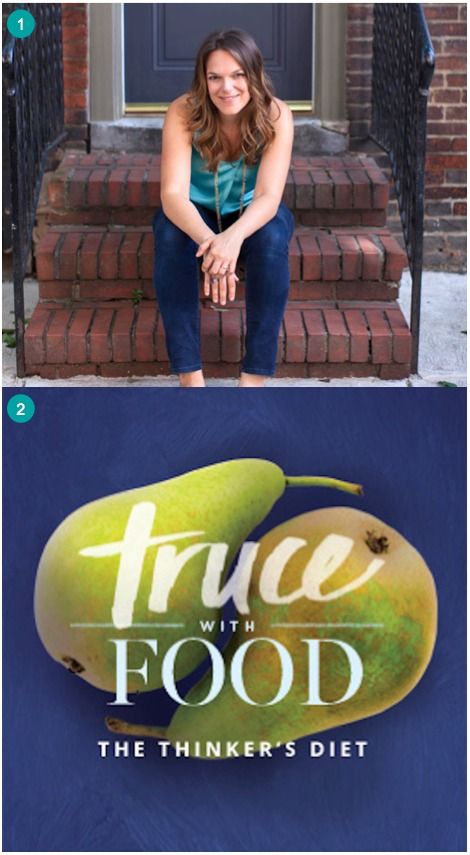
By Judy Moon and Associates Guest Blogger: Ali M. Shapiro, MS, CHHC
“The week before my period. For. Get. It. Chips. Chocolate. Fries! Working out? Blah. I know what I should do. But I don’t do it. I have no clue why.”
This confession—delivered in a tone weighed down by shame, sadness, and frustration—comes in the early weeks of my Truce with Food program. This participant (let’s call her Andrea) has been conditioned to expect more confusing nutrition facts, a detox, or to be prescribed yet another strict diet.
But what Andrea needs is not more information, she needs more understanding.
For veteran dieters like Andrea, the fall season feels like a second New Year. Another chance to get it right. And yet, lasting results? Elusive. Willpower? Most burn through reserves in two weeks. Rinse and repeat. But why?
One culprit: The same mindset of restriction and vigilance around food (that feeds the dieting-shame cycle) persists.
A good first step in stopping this cycle is to reboot your healthy living mindset. To do this requires a multi-pronged approach.
Here is a snapshot of how I guided Andrea (and what lessons you can draw). To frame this, I’ll borrow inspiration from another client who described me as the Swiss Army knife of wellness, “You’re like a nutritionist, trainer, and psychologist in one package!”
Nutritionist: Simple Doesn’t Mean Easy.
Many women believe PMS just comes with the territory. Nope. You can drastically lessen or eliminate “symptoms” when you learn to eat and exercise with your body’s rhythms.
Andrea was diagnosed with Premenstrual Dysphoric Disorder (PMDD). What she thought she “should” eat was actually aggravating her condition.
One culprit: Luna bars. The soy protein isolate in these added excess estrogen, aggravating her PMDD. We swapped in KIND bars and homemade trail mix containing nuts. One root cause of PMDD is deregulated blood sugar; the real fat from nuts served to stabilize this.
Andrea didn’t need a complicated plan, she needed to get back to basics with real whole foods. Soon, Andrea’s symptoms and period week no longer caused her such distress and her cravings and moods improved. Because she felt these shifts internally—and wasn’t chastised by some plan or authority figure—her motivation to stick with these changes lasted.
For you: Add in more whole foods to crowd out processed ones (no packages). Eggs with the yolks. Full-fat yogurt. Vegetables. Fruits. You know, the perimeter of your grocery store. Cringed reading the words “full-fat”? You’re not alone. In my program, I dispel nutrition myths keeping you right where the food companies (and the diet industry) want you.
Trainer: Context Is Everything.
Most people hire trainers for accountability. Yet many trainers ignore context: Your body is a machine and they’re the mechanics.
Andrea traveled frequently for work. She was constantly “on.” Despite being exhausted—especially during the last two weeks of her menstrual cycle—she forced herself onto hotel gym treadmills. Physiologically, the excess cardio further aggravated her blood sugar. Psychologically, exercise became punishment for bad food choices. But then those same “bad” food choices became a (secret) reward for exercising.
For you: Are you bored? Need a new exercise routine or creative outlet? Do you need lighter workouts like yoga and walking to help your body heal? Contextualize what’s right for you at this moment.
Psychologist: I’m Not Where I Want to Be.
Diets fail for many reasons, but mainly because they don’t address the deeper beliefs guiding our behaviors.
One of the ways to delve into these beliefs is by exploring the concept of growth mindset. Coined by Dr. Carol Dweck, this strategy focuses on rewarding yourself for effort versus outcome to paradoxically exceed your goals.
With food, this means replacing judgment with curiosity. Instead of beating yourself up, you learn to ask the right questions to figure out why you did what you did. And when you succeed? You’ll know what worked.
Over time, Andrea discovered much of her secret eating during the last two weeks of her cycle came from resisting feeling “emotional.” She felt bad for feeling bad! She closed off this side of herself from the people she needed the most. The solution: She expressed her needs to her loved ones. When she needed the courage and support, she had me and the other strong women in our group on standby.
For you: Next time you self-sabotage, tell yourself you haven’t figured this out…YET! Adding “yet” shifts you onto a learning (not punishment) curve that will serve as the bridge to get you from where you are to where you want to be.
The strategies introduced in this short post are necessarily just the tip of the iceberg. If you’d like a deeper dive, click here to receive the first lesson of my Truce with Food program for FREE! You have nothing to lose (other than another season of dieting) and stand to gain more than you ever thought possible.
Ali Shapiro, MS, CHHC, is a health coach, speaker, and author. She combines her background in functional medicine, holistic health counseling, and Masters degree from the University of Pennsylvania in her Truce with Food® program. Ali is also a 22-year cancer survivor.
Ali has been featured in the Wall Street Journal, Yahoo Shopping, Huffington Post, Redbook Magazine, Philadelphia Inquirer, Philadelphia Magazine, and was a regular health contributor to the NBC 10! Show. She’s also appears on popular wellness sites such as KrisCarr.com, MindBodyGreen, and Tiny Buddha.

Thanks!